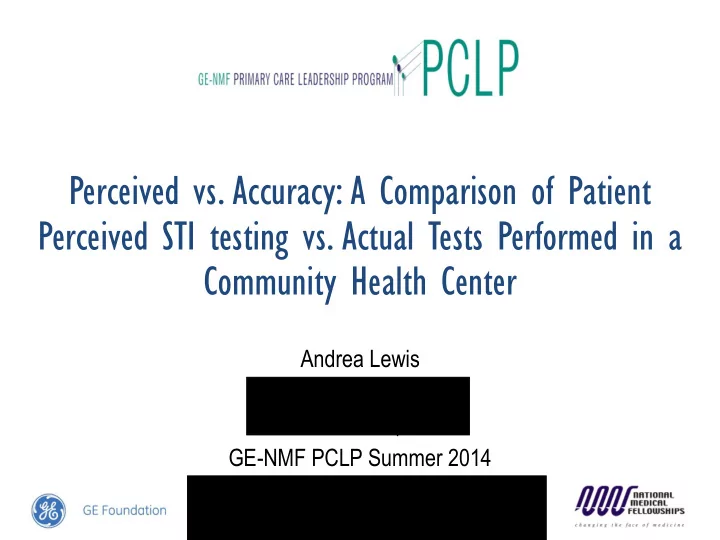

Perceived vs. Accuracy: A Comparison of Patient Perceived STI testing vs. Actual Tests Performed in a Community Health Center Andrea Lewis CentroMed-Walzem Rd. San Antonio, TX GE-NMF PCLP Summer 2014
Introduction • CentroMed-Walzem Clinic • Among the top 3 largest clinics of CentroMed in revenue, population served, and building size • Shadowed 4 Providers • High amount of STI screening/testing • On-site LabCorp • STIs in Texas 1 • Chlamydia • Gonorrhea • HIV
Background • 1 in 4 individuals affected 2 • Incidence (20 million new infections/yr) + Prevalence (110 million infections) 16 BILLION dollars • 5 major strategies for prevention and control: 3 • Advise and educate • Identify asymptomatic and symptomatic infected people • Effective diagnosis, treatment, and counseling • Evaluate, treat, and counsel sex partners of persons who are infected with an STI • Pre-exposure vaccination of high-risk people • CDC encourages providers to inform patients receiving STI testing of all STD’s they are being tested for and the common ones they are not 3 • Patients have a general misunderstanding of STI screening procedures • Previous research found 40% of young women thought routine STI testing included all eight STIs 4
Methodology • Study Overview • Purpose: Accurate identification of STDs • Subjects/Recruitment Procedures • Patients attending onsite LabCorp at CentroMed-Walzem St receiving STI testing that included at least one blood test • July 21, 2014-August 12, 2014 • STI testing indicated by LabCorp staff and number written on sign-in chart and survey • Recruited at end of each visit and provided with consent form and survey
Methodology • Measures • Eight-item questionnaire provided in English/Spanish • Demographic Questions • Reasons for visit • Which STIs • Referring Provider • Concerns Addressed • Anonymity ensured by placing survey in drop-box • Clinic staff blinded to purpose of study, survey content, and response of participants • Analysis Plan • Surveys linked to patient charts via number provided during check-in and listed on complete surveys • 2011 Microsoft Excel used for: • Descriptive statistics • Frequencies • Other data
Results-Demographics • 101 patients asked to be surveyed • 1 declined • 100 participants • 70% of surveys completed in English; 30% completed in Spanish 17 and Gender Age under 1% Male 45+ 13% 17% 18-24 31% 35-44 13% Female 25-34 87% 38%
Results-Demographics B.S. or Education Level Race higher Tech/Ass 6% oc Degree Multi White 10% 8% 11% Less than HS diploma AA 29% 26% Some College Hispanic 25% 55% HS diploma 30%
Results-Reason for visit and Frequency Participant Reported Reason(s) Frequency of Tests Performed for Visit 94 100 My provider wanted… 60 90 80 62 65 Other 19 70 60 I wanted to be… 13 50 40 Experiencing… 7 28 30 16 20 Exposed to an STD 4 6 10 1 0 Partner wanted me… 1 0 0 20 40 60 80
Results-Identification of Testing Status and Patient Satisfaction Were you tested for an Were your concerns addressed STI/STD today? during your visit? 38 36 100 90 36 80 34 34 60 32 30 40 30 20 28 7 3 26 0 Yes No Don't Know Yes No No Answer
Results-Participant Identification of Tests Performed
Results-Referring Provider
Discussion • Gender and Education Level Inconsistent with population demographics for SA • Race Consistent with demographics of uninsured and underserved • Language Consistent with demographics for SA • Age 25-34 age group overrepresented compared to SA Childbearing?? • Reason for visit • Differ from a previous studies (due to a STI-related symptom) • Frequency of Tests Performed • HIV, Gonorrhea, Chlamydia- most commonly tested at CentroMed-Walzem Rd. • CDC states include HIV screening in all patients 13-64 in all healthcare settings CentroMed doing great! • Most prevalent STDs in the US HPV, Herpes, Trichomoniasis • No patient tested specifically for Trichomoniasis • CDC vs USPSTF for Herpes
Discussion • Identification of Testing Status • Misunderstandings of STD testing present a risk because patients are often only told the specifics of their testing if a positive test result is received • Majority of participants did not know they were tested for STI • Blinded Study • Surveys separated by week • No trend in increasing amount patient knowledge of STI testing identified • Referring Provider • OBGYN with most referrals Pregnancy and Pap smears??? • Patient Satisfaction • Majority felt concerns were addressed-only 10 able to accurately identify all test performed • Falsely elevated sense of patient satisfaction • Maybe if they had known which tests were and were not performed, they would say the opposite
Conclusions/Recommendations • Patients are generally unaware of which STIs they are being tested for • Prevention of STIs and correct identification of patients infected is critical in order to decrease the prevalence and potentially negative outcomes of these illnesses • Clear communication between HCPs and their patients is essential to meeting this goal • HCPs should conform to CDC recommendations regarding STI testing • Educational efforts for HCPs to inform them of CDC recommendations and importance of patient education regarding STD testing • Perform studies after training of healthcare providers to see if the efforts targeted at providers result in increased patient education and knowledge of testing status
References 1. Department of State Health Services. 2012 Texas STD and HIV Epidemiologic Profile. Revised February 20, 2014 2. Incidence, Prevalence, and Cost of Sexually Transmitted Infections in the United States. Center for Disease Control and Prevention; February 2013. Accessed July 14, 2014: http://www.cdc.gov/std/stats/STI-Estimates-Fact- Sheet-Feb-2013.pdf 3. Morbidity and Mortality Weekly Report. Sexually Transmitted Diseases Treatment Guidelines: Center for Disease Control and Prevention; 2010. Accessed July 14, 2014: http://www.cdc.gov/mmwr/preview/mmwrhtml/rr5912a1.htm 4. Tanzola, M. Many Young Women Uncomfortable, Uneducated about STD Testing Process. Clinical Psychiatry News. March 24, 2010. Accessed July 14, 2014: http://www.clinicalpsychiatrynews.com/shared/shared- articles/many-young-women-uncomfortable-uneducated-about-std-testing- process/74f14a0d39a2352b6436079d77ba0c51.html 5. http://www.sanantonio.gov/Portals/0/Files/health/News/HealthProfiles- 2010.pdf
Recommend
More recommend